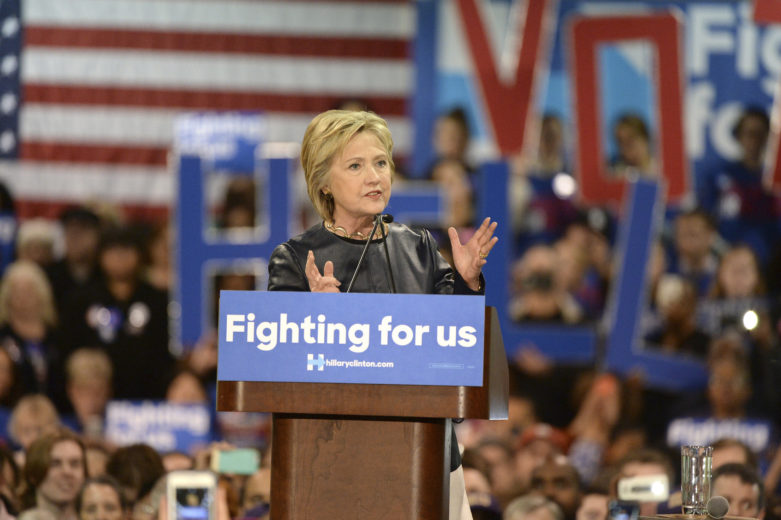With Secretary of State Hillary Clinton accepting the nomination of the Democratic Party in Philadelphia last week, the battle lines for November were officially set. Here are five things that Latinos learned from the display of Democratic ideals and policies.
1. Democrats Are Willing to Put Immigrants – Legal and Undocumented – Front & Center
From elected leaders like Rep. Luis Gutierrez, or Rep. Loretta Sanchez to immigrant activists like DREAMER Astrid Silva and 11 -year old Karla Lopez, Democrats made it clear not only that they were the party of diversity but of comprehensive and compassionate immigration reform.
While Republicans spent their 15 minutes of fame in Cleveland promoting a security-first approach to immigration that sought to penalize undocumented families and their allies, Democrats rolled out their most progressive platform position on the issue to date. This compared to 2012, when Democrats went with a law and order them approach, that emphasized the need for everyone to wait in line for their chance at the American Dream.
The display also doesn’t just seem for show. Latinos hold key positions in Hillary Clinton’s campaign structure. People like Amanda Renteria (National Political Director), Betsaida Alcantara (Director of Media Planning), Jose Villarreal (Treasurer) and Xochitl Hinojosa (Director of Coalitions Press) are all staffers with years of experience in politics and working for the national campaign team and not just in Latino specific positions.You could argue about the parties’ approach to the issue, but it seems at least in one party, Latinos are helping to craft policy and not just defending it.
2. Not All Issues Find a Place in Prime-Time
Although immigration is an important issue for Latinos, especially recent arrivals, some issues were still unaddressed. For all the talk of Clinton’s decades long advocacy of children and families, none of policy discussions focused on the current plight of young Central American refugees that continue to pour in, or the way that the Administration’s current detention policies criminalize and separate families. Also, despite several Hamilton-related name drops and the Puerto Rican delegation’s forceful declaration of being the only “all-Latino” delegation during Tuesday’s roll-call vote, the economic crisis and political status of Puerto Rico was relegated to “off the convention floor” conversations. This, despite the crucial role that Puerto Rican voters will play during the election process, especially in key battle ground states like Ohio, Pennsylvania and Florida.
“There are more than 300,000 Puerto Ricans in the South Florida area, in the Tri-County area,” Natascha Otero-Santiago, Board member for the newly formed National Puerto Rican Agenda, told Democracy Now’s Amy Goodman during a convention segment. “A lot of people give attention to the Puerto Ricans in Orlando, Tampa, the I-4 corridor, but a lot of people don’t know about how many Puerto Ricans have moved and migrated to South Florida in the last 10 years. So, I think it’s necessary to pay attention to that Puerto Rican community of professionals that are moving to South Florida.”
3. Lots of Folks – Including Millennials – Are Still Feeling the Bern
Being the first mainstream party to nominate a woman for President is historic and makes everyone proud. But, as supporters of Bernie Sanders made it clear, not everyone in Philadelphia agreed that Hillary Clinton should be that woman. Feelings of their candidate being cheated out of the nomination were only made stronger when publicized emails from the DNC confirmed the animosity that party leaders had for Senator Sanders and his supporters. While the Sanders campaign’s relationship with communities of color was often criticized during the primary process, delegates for the Vermont Senator were diverse and very eager to speak to the media on their hopes for something better, even as they worked against Donald Trump’s election.
“A lot of voters, a lot of young voters, are disillusioned and disempowered and we don’t need that right now,” said immigration activist and Sanders campaign spokesperson and delegate Erick Andiola. “I really hope that this is a chance for the party to really get better. To really open their arms and welcome a new generation of voters, who right now are a lot more aware of what’s going on. And we need that to be able to defeat Donald Trump.”
4. Latinx Not 100% Sold on Tim Kaine
Make no mistake, Latinos were generally disappointed that one of their own would not be named onto 2016’s historic ticket. It’s not just because of the role that the Latinx electorate will have on this year’s election, but also because of the hard work so many have put into the party over the last decade. That being said, people were warming up to Senator Tim Kaine of Virginia, the liberal Jesuit-turned civil rights attorney-turned elected official. No one wanted to say that spending time in Honduras and still being able to speak Spanish better than some legislators would convince Latino abuelitas and millennials alike that he was down. Yet, like the cool blanquito that you can take to the family barbecue, it does seem to make communicating a lot easier — and decreases the likelihood that he’ll embarrass you among friends.
5. The Pipeline Looks Strong
Whether you are talking about party loyalists, Bernie supporters or just unaffiliated activists, there was a general feeling among Latinx that not having qualified Latino candidates for appointed positions is a fading notion.
However, whether the current crop of Latino officials will make way for new leadership is an open question. Given that consulting gigs and other post-public service leadership opportunities have never been as easily open to elected officials of color as they have been to their white colleagues.
However, more importantly, efforts by organizations liken NALEO, NCLR, Voto Latino and the New Leaders Project are working hard to train public servants outside the party apparatus.
“When we look at the statistics of our representation right now, it’s mostly straight white Christian men. That will change. The question will be how? said New York City Council Member Carlos Mencheca, a NALP alumn and board member. “We have to be ready with a grassroots effort in every state at the municipal and school board local level to start taking those state and federal [positions].”

